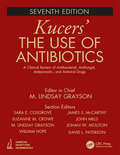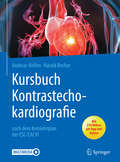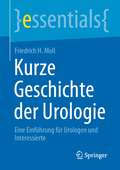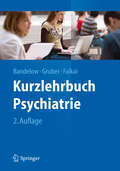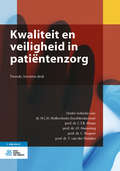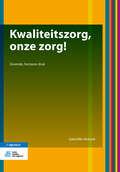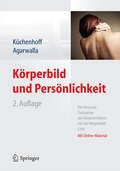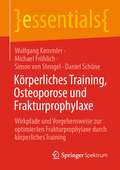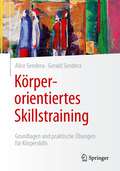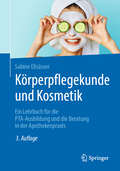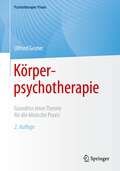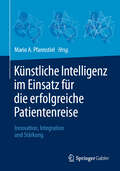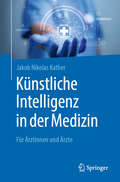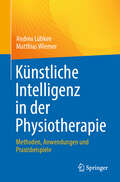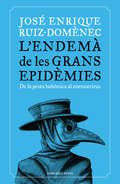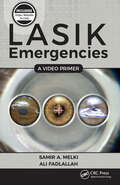- Table View
- List View
Kuby Immunology
by Thomas J. Kindt Barbara A. Osborne Richard A. Goldsby Janis KubyKuby Immunology is the first and only true textbook written by professors who teach the undergraduate course. It presents the most current concepts in an experimental context with clinical advances highlighted in boxes, supported by the kind of helpful pedagogical tools that other books do not provide.
Kucers' The Use of Antibiotics: A Clinical Review of Antibacterial, Antifungal, Antiparasitic, and Antiviral Drugs, Seventh Edition - Three Volume Set
by William Hope David L. Paterson John Mills Johan W. Mouton M. Lindsay Grayson Suzanne Crowe James S. McCarthy Sara E. CosgroveKucers’ The Use of Antibiotics is the definitive, internationally-authored reference, providing everything that the infectious diseases specialist and prescriber needs to know about antimicrobials in this vast and rapidly developing field. The much-expanded Seventh Edition comprises 4800 pages in 3 volumes in order to cover all new and existing therapies, and emerging drugs not yet fully licensed. Concentrating on the treatment of infectious diseases, the content is divided into four sections - antibiotics, anti-fungal drugs, anti-parasitic drugs, and anti-viral drugs - and is highly structured for ease of reference. <P><P>Each chapter is organized in a consistent format, covering susceptibility, formulations and dosing (adult and pediatric), pharmacokinetics and pharmacodynamics, toxicity, and drug distribution, with detailed discussion regarding clinical uses - a feature unique to this title. Compiled by an expanded team of internationally renowned and respected editors, with expert contributors representing Europe, Africa, Asia, Australia, South America, the US, and Canada, the Seventh Edition adopts a truly global approach. It remains invaluable for anyone using antimicrobial agents in their clinical practice and provides, in a systematic and concise manner, all the information required when prescribing an antimicrobial to treat infection.
Kursbuch Kontrastechokardiografie: Nach Dem Kernlehrplan Der Esc/eacvi
by Andreas Helfen Harald BecherEchtzeitbildgebung in der Kardiologie - schnell, einfach, strahlungsfrei und kosteneffizient!Dieses Buch ermöglicht als praktisches Arbeitsbuch die Umsetzung der Kontrastechokardiografie in die klinische Routine. Das Buch vermittelt Ihnen Schritt für Schritt wie Sie die Indikation zu einer Kontrastuntersuchung stellen, eine Aufklärung durchführen und selbstständig die Untersuchung ausführen können. Hierzu wurde besonderer Wert auf die Beschreibung von Geräteeinstellung und Bildoptimierung gelegt, sowie auf die Erkennung und Minimierung von Artefakten.Vorteile:eBook Inside: Downloadcode im Innenteil des Buches für das eBook auf www.springer.com enthalten (kostenlose Registrierung erforderlich)Videos per App: Laden Sie die Springer Multimedia App herunter - Abbildungen im Buch per App mit Handy oder Tablet scannen, um Videos zu streamenAlle Videos bequem auf einen Blick: 219 Videos kapitelweise und übersichtlich dargestellt auf springermedizin.de (kostenloser Log-in benötigt) und verlinkt im eBookpraxisbezogene Arbeitsanleitung mit Tipps zu Geräteeinstellung, Bildoptimierung und Bildinterpretationüber 450 Abbildungen zum besseren VerständnisInhaltliche Schwerpunkte: Messung der Ejektionsfraktion und der LV-Volumina Einsatz von Kontrastmittel in der transösophagealen Echokardiografie, sowie in der Stressechokardiografie Eigenes Kapitel zur neuen Methode der Myokardperfusion nach Vasodilatatorstress Eigenes Kapitel zur transthorakalen Darstellung der Koronargefäße Die Kontrastechokardiografie stellt eine unverzichtbare Erweiterung echokardiografischer Arbeitsmethoden dar und hat Eingang in zahlreiche Leitlinien, sowie den Kernlehrplan der ESC/EACVI gefunden, der als Grundlage nationaler Curricula für Echokardiografie dient und die Kontrastechokardiografie somit als Teil der kardiologischen Grundausbildung definiert.
Kurzdarmsyndrom - Ernährungstherapie bei Kindern und Erwachsenen
by Johannes Hilberath Martina Kohl-Sobania Andreas Pascher Valerie StolzDas Kurzdarmsyndrom ist die häufigste Ursache des chronischen Darmversagens und stellt ein seltenes und zugleich komplexes Krankheitsbild dar. Hierbei kommt der Ernährung in jeder Phase der Erkrankung eine kritisch-relevante Bedeutung zu. Patientenseitige Faktoren wie die verbliebene Restdarmanatomie und funktionelle Resorptionskapazität erfordern ein individuelles ernährungstherapeutisches Vorgehen. Dieses Fachbuch bietet der Leserschaft einen praxisorientierten, verständlichen und wissenschaftlichen Überblick zur oralen und enteralen Ernährungstherapie beim Kurzdarmsyndrom: vom Neugeborenen bis zum Erwachsenen sowie von der unmittelbaren postoperativen Zeit bis zum Abschluss der Adaptationsphase und über das Erreichen der stets angestrebten enteralen Autonomie hinaus. Zudem werden Grundlagen und pathophysiologische Zusammenhänge im Kontext der Ernährung erläutert, deren Kenntnisse für eine erfolgreiche Ernährungstherapie von Bedeutung sind. Für die erste Auflage dieses Praxisbuches wurden Evidenz und praktische Erfahrungen von Expertinnen und Experten zusammengetragen, um einen Beitrag zu einer gesunden und an das Kurzdarmsyndrom adaptierten Ernährung zu leisten – unter Beachtung der Lebensqualität betroffener Patientinnen und Patienten. Somit richtet sich dieses Werk berufsgruppenübergreifend an Ärztinnen und Ärzte sowie Ernährungsfachkräfte und interessierte Betroffene bzw. Angehörige.
Kurze Geschichte der Urologie: Eine Einführung für Urologen und Interessierte (essentials)
by Friedrich H. MollDie historische Entwicklung der Fachdisziplin der Urologie ist spannend und interessant. Insbesondere, weil die Wurzeln des Faches u.a. in Deutschland und Österreich liegen.In diesem Essential werden wichtige Schlüsselmomente aus der Urologie, Andrologie und benachbarter Gebiete zusammengetragen. Kurzweilig erhält der Leser einen Überblick zur historischen Entwicklung dieses medizinischen Fachgebietes. Neben den großen Themenkomplexen wie der Steintherapie, Prostatachirurgie, Uro-Radiologie und Zystoskopie-Endoskopie finden auch spezielle Aspekte der Entwicklung der medizinischen Fachgesellschaft, der Urodynamik und der Transplantationsmedizin Berücksichtigung. Die Zielgruppen Urologen, angehende Fachärzte der Urologie, interessierte Mediziner, Allgemeinärzte, Medizinhistoriker
Kurzlehrbuch Psychiatrie
by Peter Falkai Dirk Wedekind Veit Rößner Jürgen Müller Borwin Bandelow Harald Scherk Thomas Wobrock Oliver Gruber Anja Schneider Jörg B. Schulz Aribert Rothenberger Ursula Havemann-ReineckeKompakt strukturiert und präzise formuliert, liefert das Lehrbuch das relevante Wissen für den Bereich Psychiatrie - unter Berücksichtigung neuester Erkenntnisse aus der Forschung, einschließlich neurobiologischer Hintergründe. So vermittelt das Buch einerseits das Wissen für den klinischen Alltag und andererseits den Stoff, der für die Beantwortung der Multiple-Choice-Fragen in den ärztlichen Prüfungen notwendig ist. Die Inhalte orientieren sich strikt an der evidenzbasierten Medizin und anerkannten Leitlinien. Mit realitätsnahen Fallberichten.
Kwaliteit en veiligheid in patiëntenzorg
by C. Wagner H.C.H. Wollersheim C. T. B. Ahaus J. F. Hamming T. van der WeijdenIn opleidingen in de gezondheidszorg wordt in toenemende mate aandacht besteed aan kwaliteitsverbetering en het voorkomen van onveiligheid in patiëntenzorg.De toegenomen aandacht voor kwaliteit van zorg blijkt bijvoorbeeld uit het recente Raamplan. In het Raamplan Artsenopleiding 2020 gaat men uit van het (bijgestelde) CanMEDS-raamwerk. Had in 2009 nog ongeveer de helft van de competenties een relatie met kwaliteit en veiligheid, professioneel gedrag en ethisch moreel denken en handelen, in 2020 is dit meer dan driekwart. Bovendien zijn veel competenties explicieter uitgewerkt in de richting van patiëntveiligheid, continuïteit van zorg, werken aan deugden en professioneel gedrag, reflectief vermogen en levenslang leren, interprofessioneel samenwerken, samen beslissen en het coproduceren van zorg. Deze onderwerpen komen uitgebreid aan bod in dit leerboek.Kwaliteit en veiligheid hebben zulk een hoge prioriteit vanwege de belangrijke consequenties voor patiënt en maatschappij. Maar wat betekent het precies om op een transparante wijze kwalitatief goede en veilige zorg te leveren? Welke rol speelt de zorgorganisatie, en hoe kan de arts, verpleegkundige of paramedicus individueel aan veilige patiëntenzorg bijdragen? Hoe worden calamiteiten voorkomen? Maar ook: hoe adequaat om te gaan met een gemaakte fout en hoe daarvan te leren?In Kwaliteit en veiligheid in patiëntenzorg wordt verhelderd wat kwaliteit van zorg is en wat voorwaarden zijn voor kwaliteitsverbetering. De verschillende dimensies als professionele, organisatorische en patiëntgerichte kwaliteit worden besproken, evenals het onderzoek naar kwaliteitsverbetering en de implementatie in de praktijk. Ondanks het streven naar optimale patiëntenzorg blijven er altijd incidenten optreden. Een apart hoofdstuk is daarom gewijd aan hoeom te gaan met een calamiteit, met oog voor patiënt, organisatie en voor eigen gevoelens en functioneren. De mogelijkheden van kwaliteitsverbetering worden in dit boek met tal van voorbeelden uit de klinische praktijk geïllustreerd.Kwaliteit en veiligheid in patiëntenzorg is geschreven door vooraanstaande Nederlandse kwaliteitsonderzoekers en verbeteraars, –professionals en zorgverleners, dieal vele bijdragen hebben geleverd aan daadwerkelijke verbetering van de patiëntenzorg. Met dit boek bieden zij iedere (aanstaande) zorgprofessional de kennis en handvatten om optimale patiëntenzorg na te streven en te reflecteren op de eigen rol hierin.
Kwaliteit en veiligheid in patiëntenzorg
by C. Wagner C. T. B. Ahaus J. F. Hamming H. Vermeulen P.J.M. van GurpKwaliteit van zorg staat onder druk door veel vraag, complexiteit en hoge kosten. Het idee van 'passende zorg' helpt om deze problemen aan te pakken. Dit boek geeft inzicht in theorieën (hoofd), het stimuleert zelfreflectie (hart) en bevat praktische tips. Het boek helpt bij het verdiepen van kennis, en ook bij het ontwikkelen van een eigen kijk op de kwaliteit van zorg. Voor (toekomstige) zorgprofessionals die niet alleen willen weten wat goede zorg is, maar ook willen begrijpen hoe ze écht het verschil kunnen maken. In deze geheel herziene druk waarvan de tekst ook online beschikbaar is, komen allereerst aan de orde: de fundamenten van het kwaliteitsdenken, zoals evidence-based practice en patiëntenparticipatie, de basismodellen van kwaliteit van zorg, de groei van de gezondheidszorg en daarmee de actuele uitdagingen. Daarnaast gaat het boek in op de context waarin (aankomend) zorgprofessionals werken. De brede context, zoals de wijze waarop in Nederland de gezondheidszorg en het kwaliteitsdenken georganiseerd is en de smallere context, zoals het teamklimaat waarin (aankomend) gezondheidsprofessionals werken, communiceren en samenwerken. De kennis wordt regelmatig afgewisseld met reflectievragen en suggesties voor verdere verdieping. De daaropvolgende hoofdstukken bieden een kader en handvaten om kwaliteitsverbeteringen daadwerkelijk vorm te geven en te implementeren in de praktijk. Dat vraagt van (aankomend) zorgprofessionals dat zij leiderschap tonen, problemen signaleren, systematisch analyseren en gericht zijn op het oplossen ervan, en zelf continu blijven leren. Immers de gezondheidszorg verandert razendsnel en dat vraagt flexibiliteit en veerkracht om de kwaliteit van zorg voor iedereen te blijven garanderen.
Kwaliteitszorg, onze zorg!
by Gabriëlle VerbeekDit handboek helpt (toekomstige) professionals in de zorg, zoals verpleegkundigen en paramedici, om hun visie op kwaliteitszorg te ontwikkelen of op te frissen en hun vaardigheden op dit gebied te vergroten. Ook is het boek erg geschikt voor wie een breed overzicht zoekt van theorievorming en praktijk bij kwaliteitszorg. Kwaliteitszorg, onze zorg! geeft je een interdisciplinair beeld van kwaliteitszorg. Theorie, praktijk en beleid komen afwisselend aan bod. Je leest interviewfragmenten en praktijkcases waarmee de gezichtspunten van hulpverleners, managers, patiënten, verzekeraars en overheid verduidelijkt worden. Bovendien word je uitgedaagd om je eigen mening te vormen. Je kunt de stof oefenen met een aantal praktische hulpmiddelen. Aan het eind van elk hoofdstuk staan werkopdrachten, waarmee je je de stof eigen kunt maken. Dit is de zevende druk van het boek Het spel van kwaliteit en zorg. Het boek heeft een nieuwe titel gekregen, om duidelijk te maken dat kwaliteit iedereen aangaat die werkt in de gezondheidszorg. Van patiënt en zorgprofessional tot inkoper en toezichthouder. In deze zevende druk zijn recente ontwikkelingen opgenomen op het terrein van overheidsbeleid, prestatie-indicatoren en de uitbreiding van het arsenaal aan kwaliteitsmethodieken. Bijvoorbeeld ‘lean’, kwaliteitskaders, zelfsturing door teams, Value Based Healthcare en richtlijnen over de kwaliteit van bestaan, DBC’s en de Doorbraakmethode.
Können Kino und Fernsehen uns zu besseren Ersthelfern machen?: Zu den Effekten der Darstellung von Reanimationen in Filmen und Serien
by Denis NewiakDurch eine qualifiziertere und häufigere Reanimation (Herz-Lungen-Wiederbelebung) könnten allein in Deutschland jedes Jahr 10.000 Leben gerettet werden. Während das erlernte Wissen aus dem Erste-Hilfe-Kurs zur Fahrschule relativ schnell vergessen ist, rufen Szenen mit Wiederbelebungen aus Serien und Filmen die Notsituation regelmäßig ins Gedächtnis. Nicht immer wird in der Fiktion allerdings so reanimiert, wie es in der Realität am besten wäre. Können die Reanimationen aus der Popkultur trotzdem dabei helfen, uns zu besseren Ersthelfern zu machen? Welchen Beitrag leisten filmische Ausdrucksformen zur Verbreitung von Wissen zu Selbsthilfemaßnahmen für Notsituationen? Und ließe sich diese Erkenntnis auf andere Lebensrisiken und entsprechende Vorsorgemaßnahmen übertragen?
Körperbild und Persönlichkeit
by Doris Straus Joachim Küchenhoff Holger Himmighoffen Puspa AgarwallaDas Praxismanual: Evaluation des Körpererlebens mit der Körperbild-Liste Das Körpererleben besser zu erfassen ist für die Diagnostik und Behandlung vieler seelischer und körperlicher Störungen enorm wichtig. Dies gilt für die große, sowohl für den Allgemeinmediziner wie für den Psychiater wichtige Gruppe der somatoformen Störungen, darüber hinaus für ein breites Spektrum von medizinischen und psychiatrischen Krankheiten, bei denen eine psychosomatische oder psychotherapeutische Behandlung angezeigt ist. Zugleich werden der Bezug zum eigenen Körper, die Freude an der eigenen Körperlichkeit, die körperliche Interaktion mit anderen etc. oft nur wenig im klinischen Alltag beachtet. Das hat gute Gründe: Das Körpererleben ist für viele Menschen schwer artikulierbar.Es ist auch in der Forschung nicht leicht erfassbar, weil es sehr subjektiv und daher schwer objektivierbar ist. Professor Küchenhoff und Doktor Agarwalla schließen diese Lücke. Mit der "Körperbild-Liste" (KB-L) stellen sie ein Rating-Verfahren vor, das es dem Diagnostiker und der Therapeutin erlaubt, das Körpererleben des Patienten angemessen zu beschreiben und therapeutisch zu nutzen. Diagnose möglich: Die systematische Analyse des Körpererlebens im Fremdurteil Grundlage der Körperbild-Liste ist die Operationalisierte Psychodynamische Diagnostik (OPD), mit der Persönlichkeitsstrukturen bzw. Strukturniveaus der Persönlichkeit einschätzbar werden. Aus der Strukturachse des OPD heraus wurde die Körperbild-Liste entwickelt. Dieses Praxismanual dient der soliden fachlichen Arbeit mit dem Körpererleben von Patienten. Liste und Manual sind im Buch enthalten - geschrieben für Psychiater, psychosomatisch tätige Therapeuten und Ärzte, Körpertherapeuten, empirische Forscher. Körperbild und Persönlichkeit - Konzept und Analyse für Fachleute
Körperliche Aktivität und Gesundheit: Präventive und therapeutische Ansätze der Bewegungs- und Sportmedizin
by Winfried BanzerDieses Buch stellt dar, wie hilfreich Bewegung und Sport bei Krankheiten sein kann, wie die Lebensqualität von Patienten gesteigert wird und Aktivität zudem als präventive Maßnahme dient.Neben den Grundlagen der Trainingslehre und der sportmedizinischen Aspekte wird ausführlich auf den Einsatz von körperlicher Bewegung bei diversen Grunderkrankungen und somatischen Störungen eingegangen.Das Buch richtet sich an Ärzte, die ihre Patienten zum einen bzgl. sportlicher Betätigung bei verschiedenen Erkrankungen beraten und zum anderen entsprechende Angebot bieten möchten. Außerdem gibt es einen Überblick über die zahlreichen Einsatzmöglichkeiten von körperlicher Aktivität über die gesamte Lebensspanne hinweg.
Körperliches Training, Osteoporose und Frakturprophylaxe: Wirkpfade und Vorgehensweise zur optimierten Frakturprophylaxe durch körperliches Training (essentials)
by Michael Fröhlich Wolfgang Kemmler Simon von Stengel Daniel SchöneDas vorliegende essential versteht sich als kompaktes Nachschlagewerk für Fragen und Aspekte rund um ein körperliches Training im Spannungsfeld der Osteoporose und Frakturprophylaxe. Schwerpunkt sind dabei evidenzbasierte Strategien und Handlungsempfehlungen zur Primär- und Sekundärprävention der Osteoporose, respektive zur Frakturreduktion sowie Kontraindikationen und mögliche Bewegungsangebote.
Körperorientiertes Skillstraining: Grundlagen und praktische Übungen für Körperskills
by Alice Sendera Gerald SenderaDen Körper habe ich immer dabei!Das Buch beschreibt theoretische Hintergründe, Didaktik, Methodik, Strategien, Modalitäten und Risiken beim Einsatz von Körperskills. Die behutsame Aktivierung und Wahrnehmung körperlicher Reaktionen aktiviert das korrespondierende neuronale Netzwerk und fördert die Neuroplastizität. Körperorientierte Skillsarbeit zielt darauf ab kreative und körperliche Fähigkeiten zu entdecken, auszubauen und für die Problem- und Alltagsbewältigung zu nutzen, ohne sich in einer Fülle von Ansätzen, Möglichkeiten und Bedingungen zu verlieren.Im Praxisteil werden strukturierte Übungsangebote aus den Bereichen: Körperachtsamkeit, Koordination und Gleichgewicht, Körperwahrnehmung und -akzeptanz, Körperausdruck und Training nonverbaler Interaktionen, Emotionsmodulation, sowie Krisen- und Hochstressmanagement vorgestellt. Die Übungen helfen dabei, von etablierten Reaktionsmustern und automatisierten Verhaltensweisen abzuweichen, die oft notwendige Modulierung zu erreichen, sowie Stärken und Ressourcen zu fördern. Übungsbeschreibungen in Wort und Bild helfen bei der praktischen Umsetzung.Angesprochen werden Menschen aus dem psychosozialen Arbeitsumfeld, medizinische, therapeutische, pädagogische und sozialpädagogische Berufsgruppen, die den Körper in die Therapie einbeziehen möchten.
Körperpflegekunde und Kosmetik: Ein Lehrbuch für die PTA-Ausbildung und die Beratung in der Apothekenpraxis
by Sabine EllsässerDas Buch bietet ein umfassendes Wissen zu Kosmetika und Pflegesystemen sowie zu Aufbau und Pflege von Haut, Haaren, Nägeln, Zähnen und der Herstellung von Kosmetikrezepturen. Die Autorin ist Fachapothekerin für die theoretische und praktische Ausbildung und hat eine langjährige Erfahrung in der PTA-Ausbildung sowie der Fort- und Weiterbildung im Bereich Rezepturherstellung. Sie beantwortet Fragen über Nutzen und Risiken von Pflegeprodukten, erläutert den Aufbau und die Biochemie von Haut, Haaren, Nägeln und Zähnen und die Charakterisierung des Hautzustandes und der Haar- und Pigmentierungstypen. Darüber hinaus gibt sie einen Überblick über Wirk-, Hilfs- und Zusatzstoffe in Kosmetika und deren Zusammensetzung, setzt sich mit Fragen der Reinigung und Pflege auseinander, geht auch auf Sonnenschutz und Deodorantien ein und entwickelt einen Bauplan für die Eigenproduktion von Kosmetika mit Rezepturbeispielen. Die 3. Auflage wurde komplett aktualisiert und ergänzt, beginnend mit der Umwandlung von nationalem Recht in EU-Recht, das mit einigen neuen Bestimmungen zu kosmetischen Mitteln einhergeht. Im mittlerweile etablierten Bereich Naturkosmetik werden neue Gütesiegel vorgestellt. In diesem Zusammenhang werden kritisch bewertete Stoffe und Stoffgruppen und deren Wirkungen unter die Lupe genommen, welche die Frage nach Naturkosmetik in den letzten Jahren nochmals verstärkten. Es werden neue Erkenntnisse in der Pharmakologie zu Haut, Haaren, Wirkungen und Wirkstoffen erläutert, neue Produktformen beschrieben, erklärt, was Blue-Light ist und die Verarbeitung von Seife vorgestellt. Die Verzeichnisse der Stoffgruppen und Fachbegriffe sowie die Liste der INCI-Bezeichnungen (International Nomenclature of Cosmetic Ingredients) wurden erneut erweitert und auf den neuesten Stand gebracht.
Körperpsychotherapie: Grundriss einer Theorie für die klinische Praxis (Psychotherapie: Praxis)
by Ulfried GeuterEin einführendes Buch für die psychotherapeutische Praxis: Körperpsychotherapie als Therapie mit Hilfe des Körpers. Geschrieben für Psychologische und Ärztliche Psychotherapeuten, explizite Körpertherapeuten (Atem, Feldenkrais etc.), aber auch viele andere Berufsgruppen, die in diesem Feld tätig sind.
Körperunzufriedenheit bei Mädchen im Jugendalter: Eine Mixed-Methods-Interventionsstudie im Sportunterricht (Bildung und Sport #31)
by Johanna KorteMädchen im Jugendalter sind häufig von einer Körperunzufriedenheit betroffen, die mit gesundheitlichen Risiken wie Diätverhalten und (sub-)klinischen Essstörungen assoziiert ist. Da sportliche Aktivität einen Faktor darstellt, der Körperunzufriedenheit verringern und ein positives Körperbild unterstützen kann, wird in der vorliegenden Studie der Frage nachgegangen, ob die Körperunzufriedenheit von Mädchen im Jugendalter durch eine spezifische sportunterrichtliche Intervention verringert werden kann. Darüber hinaus werden im Rahmen einer qualitativen Teiluntersuchung stark körperunzufriedene Mädchen und ihre subjektive Sichtweise in den Fokus gerückt. Es wird analysiert, wie sie ihr Körperbild, ihre sportliche Aktivität und die sportunterrichtliche Intervention wahrnehmen. Beide Teilstudien sind in ein Mixed-Methods-Design eingebettet.
Künstliche Intelligenz im Einsatz für die erfolgreiche Patientenreise: Innovation, Integration und Stärkung
by Mario A. PfannstielIn diesem Fachbuch steht die Perfektionierung der Patientenreise im Fokus, indem KI(-Management) als Schlüsselfaktor im Gesundheitswesen betrachtet wird. Die strategische Ausrichtung von KI basiert auf drei Schlüsselprinzipien: Innovation, Integration und Stärkung. Der Buchinhalt soll sich auf vier Teile aufgliedern, beginnend mit der Bedeutung der Patientenreise im Gesundheitswesen, gefolgt von der Rolle von KI(-Management) in dieser Reise. Anschließend sollen die Optimierung der Patientenreise durch KI(-Management) aufgezeigt und Erfolgsfaktoren sowie Best Practices dargestellt werden.
Künstliche Intelligenz im Gesundheitswesen: Entwicklungen, Beispiele und Perspektiven
by Mario A. PfannstielKünstliche Intelligenz (KI) nimmt schon heute Einfluss auf Beruf und Alltag und begleitet die Menschen bei der Erledigung von Arbeitsaufgaben. Im Gesundheitswesen gilt KI als Schlüsseltechnologie und als Motor für Fortschritt und Beschäftigung. Neue Algorithmen tragen dazu bei, dass KI zum Game Changer im Gesundheitsmarkt wird. Herkömmliche Behandlungswege bei der Diagnostik und bei der Therapie von Patienten verändern sich. Medizinisches und pflegerisches Personal soll durch den Einsatz von KI unterstützt und entlastet werden. Künstliche Intelligenz verspricht einen hohen Nutzen für Individuen und Unternehmen. Dabei sind jedoch auch die sozialen, finanziellen, technischen und rechtlichen Rahmenbedingungen zu berücksichtigen. Trotz der vielfältigen Möglichkeiten ist der Einsatz der Künstlichen Intelligenz bei personenbezogenen Daten und in bestimmten Geschäftsmodellen kritisch zu hinterfragen und zu reflektieren.Das vorliegende Herausgeberwerk gibt einen Überblick zu aktuellen - bisweilen kontrovers diskutierten - Themen aus Theorie, Forschung, Transfer und Praxis. In 43 Beiträgen stellen 82 renommierte Autoren und Experten ihr Wissen, ihre Erkenntnisse, Erfahrungen und Einschätzungen vor. Es werden Lösungsansätze und Problemfelder beim Einsatz von Künstlicher Intelligenz im Gesundheitswesen aufgezeigt. Durch eine anschauliche Clusterung und Einordung der Buchbeiträge in themenbezogenen Übersichten eignet sich das Werk sowohl für Einsteiger als auch für Praktiker und Wissenschaftler.
Künstliche Intelligenz in der Medizin: Für Ärztinnen und Ärzte
by Jakob Nikolas KatherWie funktionieren Sprachmodelle? Welche ethischen Fragen stellen sich bei der Anwendung von KI? Und was kann KI in der Medizin und was nicht? In der Medizin besteht auf allen Ebenen ein großer Bedarf, mehr über KI zu lernen. Antworten auf diese und viele weitere Fragen gibt Ihnen dieses Buch. Von den Grundlagen der KI allgemein über KI in der klinischen Praxis und Forschung bis hin zu offenen Fragestellungen beleuchtet der Autor die relevanten Aspekte der KI für die Medizin. Zahlreiche Beispiele und Entwicklungsmöglichkeiten geben eine Momentaufnahme und einen Ausblick auf eine innovative Medizinlandschaft, in der KI und menschliche Expertise sich gegenseitig ergänzen.
Künstliche Intelligenz in der Physiotherapie: Methoden, Anwendungen und Praxisbeispiele
by Andrea Lübken Matthias WiemerDieses Fachbuch bietet eine praxisnahe Einführung in die Anwendung von KI in der Physiotherapie. Es enthält Fallbeispiele, die direkt im beruflichen Alltag angewendet werden können. Ein besonderer Schwerpunkt liegt auf dem Clinical Reasoning. Detailliert wird gezeigt, wie klinische Entscheidungsprozesse methodisch und praxisnah mit KI kombiniert und optimiert werden können. Speziell auf die praktischen Anforderungen von Physiotherapeut*innen zugeschnitten, vermittelt es konkrete Anwendungsbeispiele. KI-Technologien wie ChatGPT oder NotebookLM unterstützen in den Bereichen Diagnostik, Therapieplanung, Dokumentation und Patientenkommunikation. Aus dem Inhalt: Theoretischer Hintergrund zu KI und deren Einsatzmöglichkeiten, praxisrelevante Übungen, Prompts und Entscheidungsbäume, Entwicklung eines digitalen Assistenten für die physiotherapeutische Praxis, Erleichterung von Therapieentscheidungen anhand von Fallbeispielen des Clinical Reasonings und verschiedenen Fachbereichen der Physiotherapie, Schrittweise Anleitungen um KI-gestützte Methoden selbst zu testen und gezielt einzusetzen. Ein Must-have für Einsteiger*innen und Fortgeschrittene, die Ihren therapeutischen Arbeitsalltag effizienter gestalten möchten.
Künstliche Intelligenz und Hirnforschung: Neuronale Netze, Deep Learning und die Zukunft der Kognition
by Patrick KraussWie funktioniert Künstliche Intelligenz (KI) und gibt es Parallelen zum menschlichen Gehirn? Was sind die Gemeinsamkeiten von natürlicher und künstlicher Intelligenz, und was die Unterschiede? Ist das Gehirn nichts anderes als ein biologischer Computer? Was sind Neuronale Netze und wie kann der Begriff Deep Learning einfach erklärt werden?Seit der kognitiven Revolution Mitte des letzten Jahrhunderts sind KI und Hirnforschung eng miteinander verflochten. Im Bereich der KI gab es in den letzten Jahren mehrere spektakuläre Durchbrüche, von alphaGo über DALL-E 2 bis ChatGPT, die so bis vor kurzem noch völlig undenkbar waren. Doch schon heute arbeiten Forscher an den Innovationen von morgen, wie hybrides maschinelles Lernen oder neuro-symbolische KI. Aber was verbirgt sich dahinter überhaupt?Anhand aktueller Forschungsergebnisse und spannender Beispiele aus der Praxis bietet dieses Sachbuch einen verständlichen Einstieg in die Grundlagen und Herausforderungen dieser faszinierenden Disziplinen. Sie erfahren, was Neurowissenschaft und Psychologie über die Funktionsweise des Gehirns wissen und wie Künstliche Intelligenz arbeitet. Lernen Sie zudem, wie KI unser Verständnis des Gehirns revolutioniert hat und wie Erkenntnisse aus der Hirnforschung umgekehrt in der Informatik eingesetzt werden, um KI-Algorithmen weiterzuentwickeln. Entdecken Sie die faszinierende Welt dieser beiden Disziplinen. Erfahren Sie, warum Künstliche Intelligenz und Hirnforschung zwei Seiten einer Medaille sind und wie sie unsere Zukunft prägen werden.
Künstliche Intelligenz: Das Psi-Organ in der Nussschale
by Dietmar DietrichDie Psyche mit dem neuronalen System verschmelzen zu können, ist ein lang angestrebtes Ziel. Wissenschaftler brauchen oft Jahre, um die Hürden auf dem Weg dahin zu begreifen. Ist das unumgänglich? Welche naturwissenschaftlichen Prinzipien liegen dem vorliegenden Modell zugrunde? Kann es ohne mathematischen Formalismus verstanden werden? Wie kann ein simuliertes Modell dieser Zusammenführung von Psyche und Neurologie – nennen wir es das Psi-Organ – aus heutiger Sicht aussehen?Mit Hilfe von Simulationsexperimenten können damit psychologische und soziale Theorien auf naturwissenschaftlicher Basis überprüft werden. Das Modell kann als Grundlage für KI-Systeme dienen, die Menschenleben retten, Energie sparen, für Sicherheit auf Flughäfen sorgen, bei der Pflege älterer Menschen unterstützen und vieles mehr. Dieses Psi-Organ-Modell geht weit über die heutigen, hauptsächlich verhaltensbasierten KI-Systeme hinaus.Das Manuskript ist als Einführung zum Verständnis und der Modellierung des menschlichen Geistes und der künstlichen, humanoiden "Intelligenz" zu verstehen.
L'endemà de les grans epidèmies: De la pesta bubònica al coronavirus
by José Enrique Ruiz-DomènecEs pot avançar cap a un futur prometedor sense mirar enrere? Cinc moments de la història ens mostren com a cada desafiament provocat per una gran epidèmia li segueix una resposta imaginativa i esperançadora. El coronavirus ha desvetllat el presagi que el món podria ser diferent de com ens l'havíem imaginat, i ens preguntem amb insistència com serà aquesta nova realitat. José Enrique Ruiz-Domènec, amb el rigor propi de l'historiador, ens convida a examinar el passat per trobar les respostes. Després de la plaga que va assolar l'Imperi bizantí a l'època de Justinià i Teodora, va venir el primer esplendor de l'islam i el naixement d'Europa. De la terrible pesta negra del segle XIV va sorgir el Renaixement. Els contagis provocats per l'arribada del espanyols al continent americà el 1492, i la verola que va acabar amb l'Imperi asteca, van impulsar les matrius econòmiques i polítiques d'Amèrica Llatina. Més tard, en ple segle XVII, les pestilències van posar Europa a la vora del col·lapse, però l'esperit revolucionari va donar a llum un nou món il·lustrat. I, finalment, l'anomenada "grip espanyola", que va desafiar el segle xx, va exigir una resposta decidida guiada pel coneixement científic, artístic i literari. En tots aquests episodis, que van generar una angoixa que avui ens és familiar, les societats van saber oferir respostes a l'altura de les circumstàncies. Sabrem ara afrontar de manera positiva les dificultats i vèncer, de nou, una gran epidèmia?
LASIK Emergencies: A Video Primer
by Samir A. Melki Ali FadlallahFemtosecond-assisted laser in-situ keratomileusis flaps have revolutionized refractive surgery since their introduction. The use of the femtosecond laser to create the LASIK flap has led to an improvement in the safety profile of the flap creation step as compared to the mechanical microkeratome. Although this laser is exceedingly safe, complications still do occur. LASIK Emergencies: A Video Primer focuses specifically on the different flap complications that are still known to occur and their management.Designed as a narrated video-based book of ophthalmic surgeries, LASIK Emergencies covers the entire spectrum of Intralase flap complications. With 15 chapters, this book and accompanying website contains nearly 4 hours of state-of-the-art video teaching.Drs. Samir Melki and Ali Fadlallah have designed LASIK Emergencies so that each chapter focuses on a specific complication and its management, and features multiple videos for each. Each video is edited in such a way that the viewer can quickly grasp all the relevant information without having to sit through extensive, unedited surgical videos.Some Complications Covered: Loss of suction Air bubbles in the Anterior Chamber Irregular Flaps Subconjunctival hemorrhage and bleeding Ophthalmologists, laser ophthalmic technicians, and optometrists alike will appreciate this unique resource, as LASIK Emergencies: A Video Primer covers the entire spectrum of LASIK complications in a detailed, yet digestible manner.

